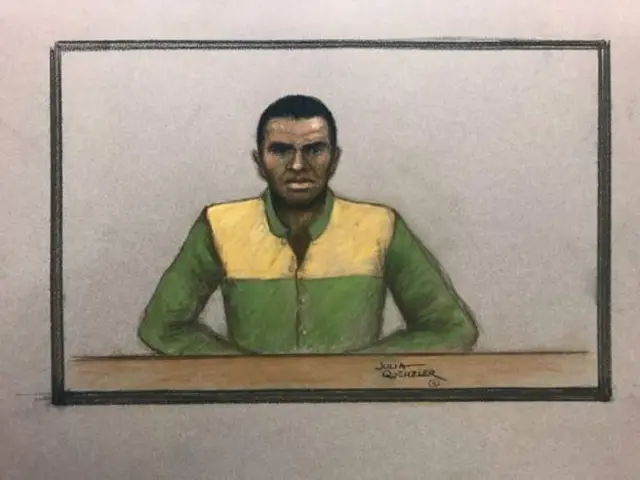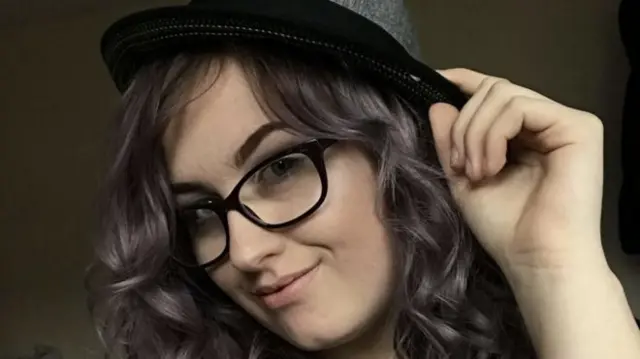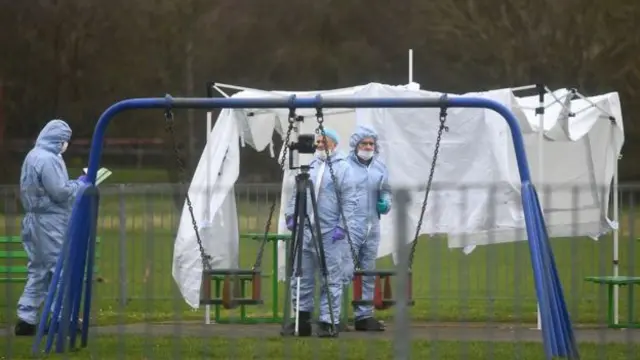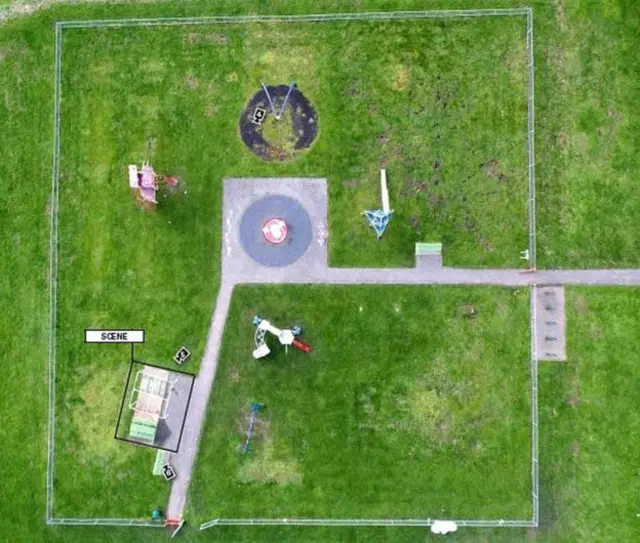Jury sent homepublished at 15:48 BST 26 September 2019
Today's trial has ended for the day.
We will be back tomorrow from 10:15 where witness Tom Giles-Wyatt will give his evidence.
Day eight of the trial of four people accused of murdering Jodie Chesney, 17.
Forensic pathologist reveals Jodie's injuries
Jodie's boyfriend had described catching her after the stabbing
Jodie was stabbed to death while with friends in Harold Hill 1 March
Manuel Petrovic, 20, and Svenson Ong-a-kwie, 19, deny murder
Two boys aged 16 and 17, also deny killing the girl
Sarah Lee and Claire Timms
Today's trial has ended for the day.
We will be back tomorrow from 10:15 where witness Tom Giles-Wyatt will give his evidence.
The jury is now being shown an image of Jodie's burgundy denim jacket with an inner fur lining - which she wore on the night she was killed.
Judge Joseph QC said jurors would only see an image of the front of the jacket, as the back "is covered in blood".
The trial into four people charged with the murder of Jodie Chesney has resumed after the afternoon break.
Yesterday the jury were shown CCTV footage of Svenson Ong-a-Kwie leaving his hostel wearing a yellow JD Sports bag on the day after Jodie's death.
Mr Ong-a-Kwie can be seen walking off and then returning 10 minutes later without the bag.
The jury have left the court for their afternoon break.
Mr Windsor explained to the jury that when one man gets out of the car near to Amy's Park, "something catches the light" (the lights of the car).
"Didn't you say that a defendant's hat with goggles also caught the light? Not to say this is happening here", Mr Aylett said.
"Yes that's right", Mr Windsor added.
We have returned from lunch where Ashley Windsor - an expert in imagery analysis - will resume giving his evidence.
The jury has been sent out for lunch.
We will return at 14:00.
Jurors have been handed a bundle of enhanced images of the CCTV clips which were shown in the court yesterday.
The CCTV film from Retford Road - near to Amy's Park - has been examined and enhanced by Mr Windsor, jurors were told.
He said the "wide stride" of the walk of one of the men who got out of the car was consistent with the stride of Mr Ong-a-Kwie that he had seen in other CCTV footage.
Witness Ashley Windsor - an expert in imagery analysis - has been called to the witness box.
The jury has returned after their morning break.
We will continue to hear from Dr Fegan-Earl.
The jury has been sent out for an early morning break.
We will return at 11:30.
 Image source, Julia Quenzler
Image source, Julia QuenzlerAn image of a knife found in Svenson Ong-A-Kwie's bedroom was shown to the jury.
The pathologist was asked whether the 19.5cm black handled single edge knife seized from the defendant could have caused the wound.
He said it was “consistent” with the fatal wound.
"This is not suggesting this knife is attributed to Jodie's death", Mr Aylett added.
Charlie Sherrard QC, for Mr Ong-a-Kwie, reminded the jury that there was no forensic evidence to suggest the knife was used to stab Jodie.
"Any bog standard kitchen knife would fit the same description, is that right?"
"Yes - I agree with that", Dr Fegan-Earl said.
 Danny Shaw
Danny Shaw
BBC Home Affairs Correspondent
A pathologist is a doctor who specialises in the causes and effects of injury, illness and disease.
The work is mainly carried out by studying cells and samples of tissue, and also by carrying out post-mortem examinations, also known as autopsies.
In cases where someone has died in suspicious circumstances, post-mortems are conducted by forensic pathologists.
Their task is to understand the cause and manner of death and report their findings, including to a court.
 Image source, Family handout
Image source, Family handoutDr Fegan-Earl told the jury he attributed the cause of death to a combination of shock and haemorrhage due to the stab wound to the back.
 Image source, Pa
Image source, PaDr Fegan-Earl told the jury, on a scale of mild to severe, at least moderate force would have been required to inflict such an injury.
The stab wound had caused the lung to collapse and to bleed heavily, he added.
Two bruises on both of Jodie's knees where found by the doctor.
"I suppose this is consistent with her falling to the ground?", Mr Aylett asked.
"Yes", the doctor replied.
 Image source, Met Police
Image source, Met PoliceJurors were shown an image of the park bench where Jodie was sat before being stabbed
Dr Fegan-Earl noted that the slightly irregular shape of the wound suggested that the knife had moved within the wound - either because her assailant had moved the knife or because Jodie had moved, he explained.
An image of the benched table where Jodie was sat when she was stabbed, was then showed to the court.
The knife had cut through skin, fat and muscle before passing between the eighth and ninth ribs and transfixing the right lung, the doctor said,
The wound track travelled upwards, from the back to the front and from Jodie’s left to right. The length of the wound track was 18 cm (7”), he explained.
The pathologist said the blade came within a few millimetres of fully penetrating through the body.
Jodie suffered a stab wound to the right side of her back - close to her spine, Dr Fegan-Earl said, holding up a computer generated image of the wound on the 17-year-old's back.
"The wound suggests that the knife used was a single blade weapon. The wound was gaping to 2.2cm," he said.